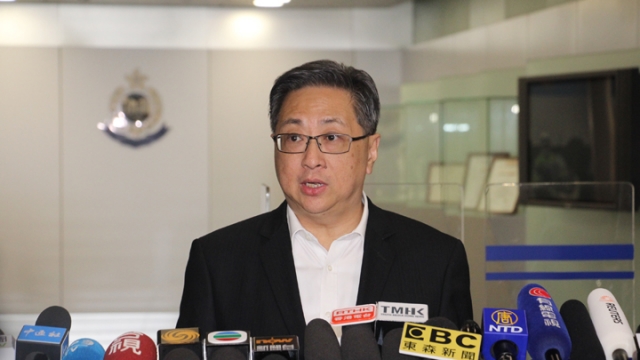Hong Kong’s police chief has backed down over his labelling of last Wednesday’s unrest as a “riot,” after protesters and the police clashed during an anti-extradition law protest. Activists, however, have not accepted his re-categorisation of the demonstration outside the legislature and government headquarters.
Police used tear gas, rubber bullets and bean bag rounds to disperse protesters who were occupying main roads in Admiralty last Wednesday. As the clearance began, both Police Commissioner Stephen Lo and Chief Executive Carrie Lam called the protest a riot. Those charged with rioting can face a decade behind bars.

However, Lo told reporters on Monday night that he did not seek to classify the whole protest as a riot.
“I was saying that, at the site, some used violence [against police], that’s why it was a riotous scene… I did not say the whole incident was a riot. I was saying that some people have committed rioting,” he said. “Most of the other people who joined the public event were peaceful protesters. They did not need to worry that they committed rioting crimes.”
Lo said only five out of the 32 arrested were involved in rioting. When asked if the police used excessive force to clear protesters, Lo said it was a decision made by the commanders on the scene.

He added that 34 complaints against police had been received in relation to the operation.
‘Love for Hong Kong’
Democratic Party lawmaker Roy Kwong urged Lo to apologise on behalf of the police, as he could not justify the level of force used.
“Now he says some people were violent, and most were peaceful – but the level of violence used could be life-threatening to all,” he said.

The Civil Human Rights Front (CHRF), an alliance of civil groups that organised the “million-strong” marches over the past two weeks, said it did not agree with Lo’s remarks.
“CHRF reiterates that none of the protesters on June 12 was a rioter. They all took to the streets out of their love for Hong Kong,” it said.

“CHRF rejects Lo’s attempt to separate the ‘Rioting Five’ from all other protestors. This narrative does nothing to address the wrongful characterization of the protests as ‘riots’ and is therefore wholly incompatible with the demands of the Hong Kong people.”
CHRF maintained its demand that all charges against protesters be dropped, and the characterisation of the protests as a “riot” be retracted.
Hong Kong has seen the largest protests in its history amid government plans to update the city’s extradition laws to cover territories with which there are no prior agreements. Introduced in February in response to a Taiwan murder, the since-postponed bill would allow case-by-case fugitive transfers to other jurisdictions – such as China – without legislative oversight. The plan prompted a chorus of criticism from democrats, lawyers, journalists, foreign politicians and businesses, who say the mainland lacks human rights protections.
Superpowers
Meanwhile, memes have appeared online following Lo’s remarks.
問:以下邊5個暴徒,令克警發放150粒催淚彈?
Posted by 千頌C on Monday, 17 June 2019
In one social media post, it is suggested that the five rioters must have been the five Power Rangers who forced the police to deploy 150 tear gas canisters. Meanwhile, other memes claimed that the five could be the characters in the Avengers movies, or Japanese anime Sailor Moon or Keroro Gunso, who of whom have superpowers.
The Hong Kong Free Press #PressForFreedom 2019 Funding Drive seeks to raise HK$1.2m to support our non-profit newsroom and dedicated team of multi-media, multi-lingual reporters. HKFP is backed by readers, run by journalists and is immune to political and commercial pressure. This year’s critical fundraiser will provide us with the essential funds to continue our work into next year.

